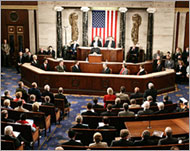Bush pushes ban on gay marriage
The US president gave a push to a constitutional amendment to prohibit marriage between members of the same sex.

The measure has no hope of passing Congress but could help Republicans in November’s congressional elections by getting out the vote.
George Bush said in a speech on Monday: “Our policies should aim to strengthen families, not undermine them, and changing the definition of marriage would undermine the family structure.”
All Senate Democrats, except Ben Nelson of Nebraska, a relatively conservative state, oppose the amendment. Together with moderate Republicans, the Democrats are expected to block a yes-or-no vote, which would stop the measure for the year.
Critics say Bush’s efforts are aimed at energising conservative voters for November, when all 435 seats in the House of Representatives and 33 of the 100 in the Senate will be open for election.
Political purpose
Democratic Senator Patrick Leahy said: “This proposed constitutional amendment is being used to satisfy the most extreme right-wing supporters and politicians. The Constitution is too important to be used for such a partisan political purpose.”
 |
|
Congress is likely to vote ‘no’ |
Senator Wayne Allard, a conservative Republican who sponsored the measure, acknowledged that politics played a part in the timing of the debate, but for a different reason: to force senators to take a stand and answer for their votes in the campaign.
“We ought to have a vote on the amendment every year,” Allard said.
The amendment would prohibit states from recognising same-sex marriages. To become law, it would need two-thirds’ support in the Senate and House, and then would have to be ratified by at least 38 of the 50 state legislatures.
The constitution is difficult to change; it has been amended 27 times in the 217 years it has been in effect.
Pressure
The White House played down the significance of Monday’s 10-minute speech, saying Bush was simply speaking out on an issue being debated on Capitol Hill.
Spokesman Tony Snow said the president was not personally lobbying senators to pass the amendment. Bush also pressed for it in his radio address on Saturday.
“I’m not sure this is a big driver among voters,” Snow said.
Bush said a constitutional amendment was needed because laws that state legislatures had passed defining marriage as being between a man and a woman were being overturned by a few judges.
“When judges insist on imposing their arbitrary will on the people, the only alternative left to the people is an amendment to the Constitution – the only law a court cannot overturn,” Bush said.
Bush rebuffed critics who argue that the amendment conflicts with the Republicans’ basic opposition to government interference and the importance of states’ rights.
“A constitutional amendment would not take this issue away from the states, as some have argued. It would take the issue away from the courts and put it directly before the American people,” Bush said.
Campaign tool
Bush’s wife, Laura Bush, said recently that while Americans wanted to debate the issue, “I don’t think it should be used as a campaign tool.”
Vice President Dick Cheney, whose daughter, Mary, is a lesbian, splits with Bush on the issue. Cheney said that he thought Americans should do everything they could to accommodate any type of relationship and that there should not necessarily be a federal policy in this area.
Joe Solmonese, president of the homosexual rights advocacy group Human Rights Campaign, said Bush was favouring an amendment that would give Americans license to discriminate against homosexuals.
“The fact that he’s out of step with the first lady and the powerful vice president tells me who he’s answering to today,” Solmonese said.
In an ABC News poll released on Monday, 58% of Americans said that same-sex marriages should be illegal. But only four in 10 said they supported amending the Constitution to ban gay marriage, while a majority said states should make their own laws on gay marriage.
With Bush taking centre stage on the issue, advocates on both sides rushed to comment.
On the left, Caroline Fredrickson, director of the American Civil Liberties Union’s legislative office in Washington, said politicians rightly rejected the amendment in 2004 and should do so again. “Discrimination has no place in America, and certainly not in our founding document,” she said.
On the right, Matt Daniels, president of the Alliance for Marriage, argued that same-sex marriage advocates were trying to circumvent the democratic process and redefine marriage through the courts. “Marriage is the social glue that unites the two halves of the human race to share in the enterprise of raising the next generation,” Daniels said.